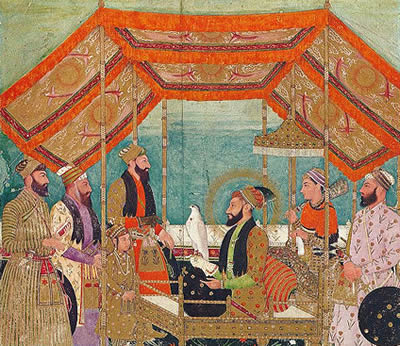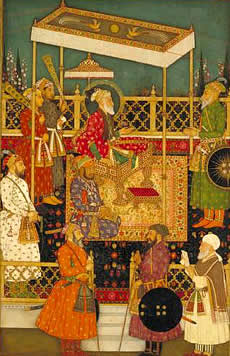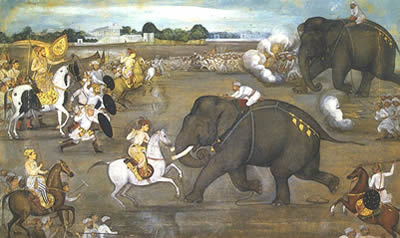World History
Aurangzeb was the sixth Mughal emperor (r. 1658–1707). He ruled for 49 years as Emperor Alamgir (conqueror of the universe); he was the last great ruler of the Mughal dynasty, but left the empire economically exhausted and widely disaffected.
As Shah Jahan aged, his sons openly rebelled against him. The winner was the 44-year-old Aurangzeb, who imprisoned Shah Jahan and killed all three of his brothers. His personal strengths included widespread administrative and military experience, strict frugality in personal life, and devotion to work. He curbed corruption and took measures to improve agriculture.
A strict and devout Muslim, he was also a bigot who had no tolerance of other religions and persecuted their followers. Thus began his troubles, which also contributed to the disintegration of the Mughal Empire. He ordered Hindu schools closed, had many Hindu temples destroyed, and ousted many Hindus from government service.
Although he could not eliminate all Hindus from government, no Hindu under him rose to high positions. The last straw for Hindus was the reinstatement of the poll tax and other harsh taxes on non-Muslims, which had been dropped under his ancestor, Emperor Akbar.
Aurangzeb’s religious policy contributed to the growth of revivalist Hinduism, a mixture of religion and what may be termed protonationalism. It began in southern India under Shivaji, who rebelled in 1662, heading the Maratha Confederacy.
Long and costly campaigns failed to end the Marathas’ insurgency. In 1683, the Rajputs, powerful Mughal supporters, also revolted, even attracting one of Aurangzeb’s sons to their cause. While his lieutenants led the campaigns against the Marathas and Rajputs, Aurangzeb took personal charge of a drawnout war in the south, where he had been viceroy under his father.
His objective was to subdue the two remaining independent kingdoms of the Deccan, beginning in 1683. He was militarily successful, with the result that the Mughal Empire under Aurangzeb extended from Kabul in the north to Cape Comorin to the south.
However, the wars left the empire financially exhausted and the overtaxed peasants in revolt. Moreover, his total preoccupation with the campaign and absence from the capital had left the administration neglected.
Aurangzeb died in 1707 at the age of 89. Because he ascended the throne after killing his brothers, he trusted no kinsman and kept all power in his own hands. His religious bigotry alienated Hindus and his focus on subduing rebels and expanding the empire left him unaware of the new shift of power among Europeans in India and the passing of maritime supremacy from the Portuguese to the English.
His Muslim generals served him faithfully in his life, but rose to usurp his inept sons’ inheritance after his death. Mughal power soon declined and fell.
- Jahangir - Mughal Ruler
Jahangir - Mughal RulerJahangir inherited the Mughal throne from his father, Akbar, the greatest Mughal emperor. His realm included part of Afghanistan and the Indian subcontinent up to the Deccan. It was one of the largest empires of the world and enjoyed...
- Mughal Empire
Mughal Empire The Mughal Empire in India was founded by Babur, also known as Zahir-ud-din Mohammed, born in 1482 in Ferghana in Central Asia, a descendant of Timurlane. With Central Asia in turmoil in 1501, Babur fled his native Ferghana and gained the...
- Battles Of Panipat
Battles of Panipat There were three battles fought at Panipat, located 70 miles northwest of Delhi, the strategically important city in northern India and capital of many dynasties. The first one was in 1526 between Ibrahim Lodi, Afghan ruler of the Kingdom...
- Rajputs
Rajputs Rajputs (literally, “children of kingsâ€) are members of a Hindu aristocratic caste (kshatriya, or warrior) settled mainly in northwestern India, who may have Central Asian origins. The Rajputs have been influential in the political...
- Sikhism And Guru Nanak
Guru NanakSri Guru Nanak Dev, founder of Sikhism, was born in 1469 in Sheikhupura district of present-day Pakistan to a Hindu family of Kshatriya caste. He was educated in Sanskrit, Persian, and Arabic. Although attracted to spiritualism, he did not...
World History
Aurangzeb - Emperor of India
 |
| Aurangzeb - Emperor of India |
Aurangzeb was the sixth Mughal emperor (r. 1658–1707). He ruled for 49 years as Emperor Alamgir (conqueror of the universe); he was the last great ruler of the Mughal dynasty, but left the empire economically exhausted and widely disaffected.
As Shah Jahan aged, his sons openly rebelled against him. The winner was the 44-year-old Aurangzeb, who imprisoned Shah Jahan and killed all three of his brothers. His personal strengths included widespread administrative and military experience, strict frugality in personal life, and devotion to work. He curbed corruption and took measures to improve agriculture.
  |   |
A strict and devout Muslim, he was also a bigot who had no tolerance of other religions and persecuted their followers. Thus began his troubles, which also contributed to the disintegration of the Mughal Empire. He ordered Hindu schools closed, had many Hindu temples destroyed, and ousted many Hindus from government service.
Although he could not eliminate all Hindus from government, no Hindu under him rose to high positions. The last straw for Hindus was the reinstatement of the poll tax and other harsh taxes on non-Muslims, which had been dropped under his ancestor, Emperor Akbar.
 |
| Aungrazeb's court |
Long and costly campaigns failed to end the Marathas’ insurgency. In 1683, the Rajputs, powerful Mughal supporters, also revolted, even attracting one of Aurangzeb’s sons to their cause. While his lieutenants led the campaigns against the Marathas and Rajputs, Aurangzeb took personal charge of a drawnout war in the south, where he had been viceroy under his father.
His objective was to subdue the two remaining independent kingdoms of the Deccan, beginning in 1683. He was militarily successful, with the result that the Mughal Empire under Aurangzeb extended from Kabul in the north to Cape Comorin to the south.
However, the wars left the empire financially exhausted and the overtaxed peasants in revolt. Moreover, his total preoccupation with the campaign and absence from the capital had left the administration neglected.
Aurangzeb died in 1707 at the age of 89. Because he ascended the throne after killing his brothers, he trusted no kinsman and kept all power in his own hands. His religious bigotry alienated Hindus and his focus on subduing rebels and expanding the empire left him unaware of the new shift of power among Europeans in India and the passing of maritime supremacy from the Portuguese to the English.
 |
| Prince Aungrazeb |
His Muslim generals served him faithfully in his life, but rose to usurp his inept sons’ inheritance after his death. Mughal power soon declined and fell.
- Jahangir - Mughal Ruler
Jahangir - Mughal RulerJahangir inherited the Mughal throne from his father, Akbar, the greatest Mughal emperor. His realm included part of Afghanistan and the Indian subcontinent up to the Deccan. It was one of the largest empires of the world and enjoyed...
- Mughal Empire
Mughal Empire The Mughal Empire in India was founded by Babur, also known as Zahir-ud-din Mohammed, born in 1482 in Ferghana in Central Asia, a descendant of Timurlane. With Central Asia in turmoil in 1501, Babur fled his native Ferghana and gained the...
- Battles Of Panipat
Battles of Panipat There were three battles fought at Panipat, located 70 miles northwest of Delhi, the strategically important city in northern India and capital of many dynasties. The first one was in 1526 between Ibrahim Lodi, Afghan ruler of the Kingdom...
- Rajputs
Rajputs Rajputs (literally, “children of kingsâ€) are members of a Hindu aristocratic caste (kshatriya, or warrior) settled mainly in northwestern India, who may have Central Asian origins. The Rajputs have been influential in the political...
- Sikhism And Guru Nanak
Guru NanakSri Guru Nanak Dev, founder of Sikhism, was born in 1469 in Sheikhupura district of present-day Pakistan to a Hindu family of Kshatriya caste. He was educated in Sanskrit, Persian, and Arabic. Although attracted to spiritualism, he did not...
